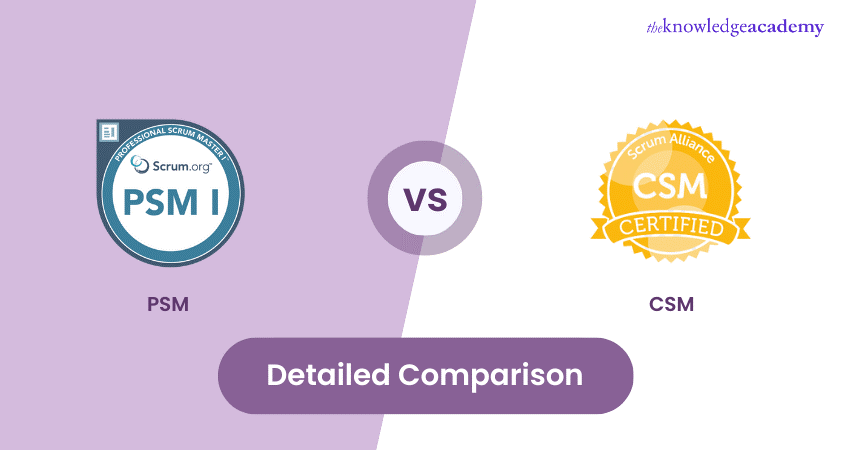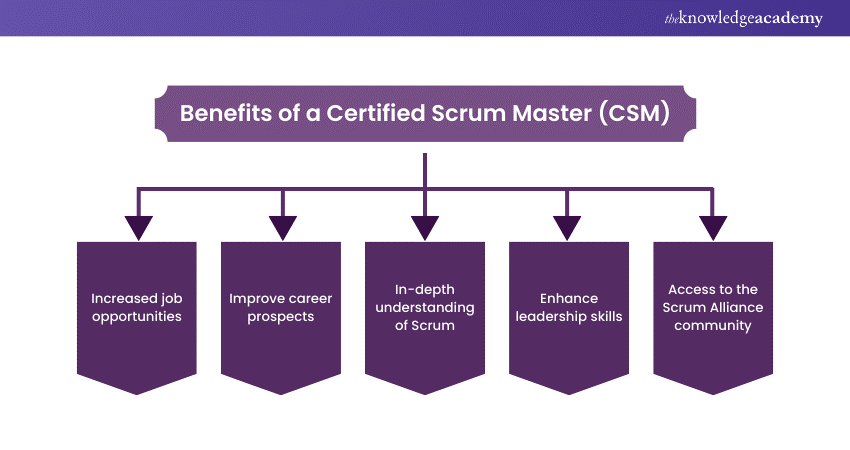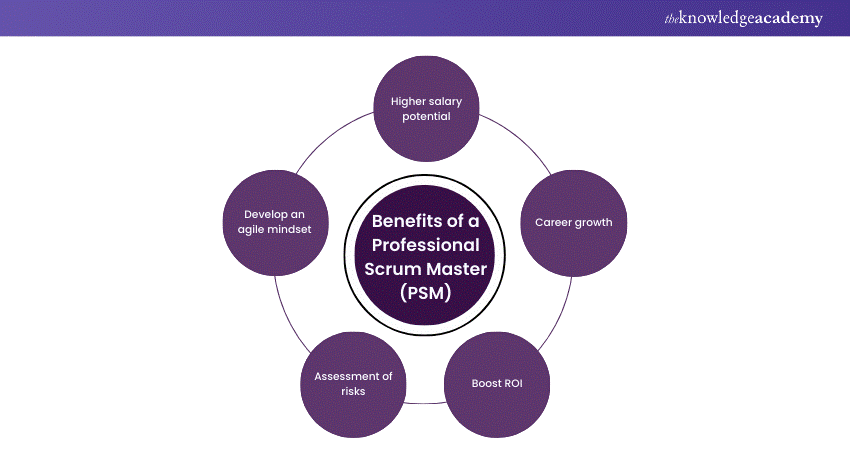We may not have the course you’re looking for. If you enquire or give us a call on +65 6929 8747 and speak to our training experts, we may still be able to help with your training requirements.
Training Outcomes Within Your Budget!
We ensure quality, budget-alignment, and timely delivery by our expert instructors.

The gold standard of software building methodology is Agile, and Scrum is one of the most popular frameworks of Agile. As a result, IT project leaders and professionals must get Scrum Master certification in the prediction of future requirements. It's a wise idea that will undoubtedly be worth it in the long run. However, there are various Scrum Master certifications available, such as Professional Scrum Master (PSM) or Certified Scrum Master (CSM). But the question which one should you choose? CSM or PSM. Read this blog and explore PSM vs CSM with a detailed comparison. Learn about their respective curriculum, requirements, and career implications with this detailed comparison.
Table of contents
1) What is a Certified Scrum Master (CSM)?
2) What is a Professional Scrum Master (PSM)?
3) Understanding the differences between PSM and CSM certifications
4) Benefits of Certified Scrum Master (CSM)
5) Benefits of Professional Scrum Master (PSM)
6) PSM vs CSM- The complete certification procedure
7) Conclusion
What is a Certified Scrum Master (CSM)?
CSM stands for Certified Scrum Master certification, which is the first and most popular Scrum Master certification. It is the designation in the context of Agile Project Management, specifically in software development. A Scrum Master is responsible for making the Scrum framework easier within a team. Scrum is an Agile methodology that encourages collaboration, adaptability and iterative development. A Certified Scrum Master (CSM) is an individual who has completed the formal training and received certification to effectively guide and support a Scrum team in executing Scrum principles and practices. Its main goal is to improve project outcomes and teamwork.
What is a Professional Scrum Master (PSM)?
PSM stands for Professional Scrum Master, and it is a role and certification in the context of Agile Project Management in software development. Scrum.org- an organisation established by one of the co-creators of the Scrum framework, has been awarded the Professional Scrum Master certification. A PSM is also an individual who has got the training and the certification to demonstrate their proficiency in Scrum principles and practices. PSM plays a huge role in facilitating the effective implementation of Scrum within an organisation, aiming to improve productivity and successful delivery of the project using Scrum methodologies.
Understanding differences between PSM vs. CSM certifications
The PSM (Professional Scrum Master) and CSM (Certified ScrumMaster) certifications pertain to the agile project management field, specifically within the Scrum framework. While they share some common goals, there are differences between these two certifications:
|
Category |
Certified Scrum Master (CSM) |
Professional Scrum Master (PSM) |
|
Governing body |
The Scrum Alliance |
Scrum.org |
|
Background |
It was developed in 2002 |
It was founded in 2009 |
|
Training |
There is a mandatory training session conducted by the Certified Scrum Trainers. |
In Professional Scrum Master, training is not required to attempt the test. |
|
Prerequisites |
None |
None |
|
Exam form |
There are 50 multiple-choice questions to complete in an hour. |
There are 80 questions, including multiple choice and true false, to be completed in an hour. |
|
Passing criteria |
In CSM, you need to give 37 correct answers out of 50 questions. |
In PSM, you need to give 68 correct answers out of 80 questions. |
|
Certification focus |
CSM certifications cover broader agile and lean principles, along with a focus on the ScrumMaster's role in team dynamics. |
In PSM, they assess your understanding of Scrum and your ability to apply it effectively. |
|
Renewal and maintenance |
CSM certifications require certification renewal every two years through Scrum Alliance's Continuing Education Units (SEUs). |
PSM certifications do not require ongoing renewal or maintenance. |
|
Community and resource |
Scrum Alliance has a larger community, local user groups, and a broader set of resources due to its longer presence in the Scrum community. |
Scrum.org offers a community and resources for PSMs but may have a smaller network compared to the Scrum Alliance. |
|
Advanced certification course |
1) Certified Scrum Master (CSM) Advanced 2) Certified Scrum Professional (CSM) 3) Scrum Master Certified Team Coach or Certified Scrum Trainer |
1) Professional Scrum Master I 2) Professional Scrum Master II 3) Professional Scrum Mater III 4) Professional Scrum Master Trainer
|
If you want to Gain comprehensive knowledge of the Scaled Agile Framework (SAFe®) for business agility, check out our Certified Scaled Agile Framework Leading SAFe® 6.0 Training And Exam Course now!
Benefits of a Certified Scrum Master (CSM)

Here are the following benefits of a Certified Scrum Master (CSM).
1) Increased job opportunities: The CSM Certification is acknowledged by employers around the world. It is a valuable credential that can help an individual get hired for Scrum Master designation in different industries. The demand for CSM is very high, and they generally earn far better than the non-certified counterparts.
2) Improve career prospects: The CSM certification can assist an individual in upgrading their career in Scrum. It can also open the doors to new opportunities to work in different industries and roles. For example- A Certified Scrum Master can also work as an Agile Coaches, Product Owners and Scrum Trainers. They can also move into management positions.
3) In-depth understanding of Scrum: In CSM certification training, an individual gets a comprehensive understanding of Scrum principles and practices. They learn how to facilitate Scrum ceremonies, remove roadblocks and help their team deliver high-quality products and services. This in-depth understanding of Scrum will be valuable throughout the individual’s career.
4) Enhance leadership skills: As a Certified Scrum Master, an individual can develop leadership and coaching skills. They learn how to build a positive and productive team atmosphere and also help their teammates to grow and develop. These skills add value to their career, both personal and professional.
5) Access to the Scrum Alliance community: CSMs automatically become members of Scrum Alliance, which gives them access to various resources and advantages, such as networking opportunities with other Scrum professionals, access to exclusive content and events, and deduction in Scrum training and certifications.
Maximize Agile effectiveness! Grasp distinctions of Agile Coach vs Scrum Master. Drive success. Get started now!
Benefits of a Professional Scrum Master (PSM)

PSM certification offers a lot of benefits. Here are the following benefits of PSM.
1) Higher salary potential: The PSM certification is a valuable asset for job seekers. It demonstrates the deep knowledge and skills in Scrum, and it makes an individual more competitive in the job market. PSMs typically earn more money than non-certified professionals.
2) Career growth: With PSM certification, an individual can enhance their career prospects in Scrum. After getting the PSM certification, an individual can have a variety of opportunities to work in different roles.
3) Boost ROI: Scrums reduce the risks of project failure, which ultimately leads to boosts in ROI for the stakeholders. Frequent feedback at every product development stage ensures fast correction of errors, which helps save time and money.
4) Assessment of risks: The PSM training helps an individual learn the skills of assessing any danger zone that might cause a project colossal failure. As a professional Scrum Master, an individual can guide the team in creating better products with fewer risks. This ultimately leads to reduced wastage.
5) Develop an agile mindset: In PSM, an individual can learn the ability to think, evolve and take action according to the rapidly evolving situation, and that is one of the best qualities to become a Professional Scrum Master. The maturity to understand that no specific approach that comes with an Agile mindset. The need for risk and exemption to failure is high with an agile mindset. With the development mindset, executing Scrum at all stages of an organisation becomes easy.
Register at our Certified Professional In Agile Project Management (CPAPM) Course now!
PSM vs CSM- The complete certification procedure
If an individual wants to work with Scrum, you need to have certification for that. Both the certification has its own unique procedure. Let's understand.
PSM certification procedure
The complete procedure for PSM certification is as follows:
1) Read the Scrum guide. This is the definitive source of information on Scrum, and it is important to have a good understanding of it before taking the PSM exam.
2) Take a PSM training course. This is not required, but it is highly recommended. PSM training courses provide a comprehensive overview of Scrum and help you to prepare for the exam.
3) Register for the PSM exam. You can register for the PSM exam on the Scrum.org website. The exam is available online and can be taken at any time.
4) Take the PSM exam. The PSM exam is an 80-question exam with a passing score of 85%. You have 60 minutes to complete the exam.
5) Receive your PSM certification. If you pass the PSM exam, you will receive your PSM certification immediately. PSM certification is valid for life.
CSM certification procedure
The complete procedure for CSM certification is as follows:
1) Attend a CSM training course. This is a two-day course from a Certified Scrum Trainer (CST). The course will teach you about the Scrum framework and how to apply it in your work.
2) Take practice exams. There are lots of CSM practice exams available online. Taking practice exams will assists you in getting knowledge about the exam structure and the kind of questions that are asked.
3) Take the CSM exam. The CSM exam is a 50-question exam with a passing score of 74%. You have 60 minutes to complete the exam. The exam is available online and can be taken any time after completing the CSM training course.
4) Receive your CSM certification. If you pass the CSM exam, you will receive your CSM certification immediately. CSM certification is valid for two years, after which it must be renewed.
Conclusion
In this blog, we have covered all about PSM vs CSM. We also explored a detailed comparison between PSM and CSM with their key benefits and certification courses. The choice between the two certifications is highly subjective. We hope you found this blog informational and helpful.
Get familiar with connecting principles, and practices to built-in quality with our SAFe® Agile Software Engineering Training Course now!
Frequently Asked Questions
Upcoming Project Management Resources Batches & Dates
Date
 Agile Project Management Foundation & Practitioner (AgilePM®)
Agile Project Management Foundation & Practitioner (AgilePM®)
Mon 9th Dec 2024
Mon 10th Feb 2025
Mon 19th May 2025
Mon 14th Jul 2025
Mon 1st Sep 2025
Mon 27th Oct 2025
Mon 15th Dec 2025







 Top Rated Course
Top Rated Course



 If you wish to make any changes to your course, please
If you wish to make any changes to your course, please


